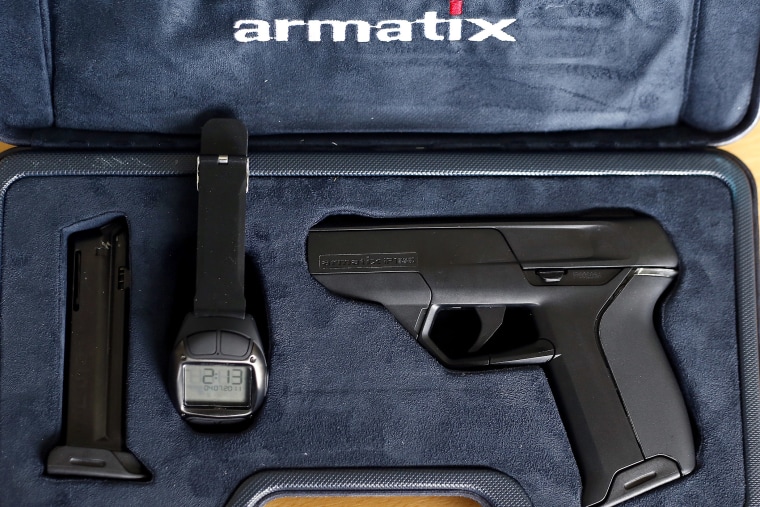Pro-gun groups are a significant obstacle for manufacturers trying to present safer firearms to the marketplace, one researcher believes.
Donald Sebastian, senior vice president for research and development at the New Jersey Institute of Technology (NJIT), described the issue of "smart gun" technology as a "chicken-and-egg situation." The aura created by most gun organizations — that a business will be boycotted or shut down if management attempts to stock shelves with safer firearms — discourages sellers from attempting to introduce the technology to consumers.
Take the German-based Armatix: the company created a pistol that cannot be fired without a corresponding radio-controlled watch held within 10 inches of the weapon. Twice, manufacturers announced plans to sell the gun, but soon reversed course in both instances because of intense backlash — including death threats — from gun rights activists.
"There is a barrier because gun advocacy groups like the NRA see the mandates as an incursion into Second Amendment rights; therefore, gun safety gets derailed in fights about gun control," Sebastian told msnbc.
Smart guns could revolutionize the firearms business. But advocacy groups fear that once such a gun reaches the market, the government could make the firearms technology mandatory and prevent people from buying traditional weapons. The NRA, along with Gun Owners of America, continue to push to prevent smart guns from reaching the market. The NRA didn't respond to msnbc's request for comment for this story, nor to messages left for previous articles.
The NRA previously warned that technologically advanced weapons have the "potential to mesh with the anti-gunner's agenda, opening the door to a ban on all guns that do not possess the government-required technology."
The NRA, the country's leading gun rights group, doesn't oppose new technological developments in firearms; however, members are opposed to government mandates that require the use of expensive, potentially unreliable features, such as grips that would read an individual's fingerprints before a gun fires, according to the organization's website.
But people in favor of reform believe such systems could prevent future mass shootings. (In the United States, there have been at least 110 mass shootings, in which four or more people die, in the past six years.) New Jersey lawmakers adopted legislation in 2002 that will eventually require the state's gun dealers sell only smart guns within three years after the first one becomes commercially available. The measure, however, had the unintended consequence of rallying opposition from pro-gun supporters to a single smart weapon.
Similar mandates have been introduced in Maryland and California.
New Jersey Senate Majority Leader Loretta Weinberg, a Democrat, said during an interview with msnbc in May that she would reverse her state's existing law if the NRA agrees not to stand in the way of smart gun technology.
Another challenge with potential mandates is enforcing an exact definition of a "smart gun," Sebastian said.
"How do you know when you have one? What are the performance specifications?" he asked.
Earlier this year, msnbc reported that smart guns were becoming more of a reality as manufacturers expected to continue testing prototypes throughout the year and politicians pushed for safer firearms on the market. The idea of "smart" firearms, also referred to as "personalized" and "owner-authorized" guns, took hold during the early 1990s when the National Institute of Justice authorized a study to find a solution to prevent law enforcement officials from being killed by their own weapons. The U.S. government started paying attention to the issue in the late 1990s, Sebastian previously told msnbc.
But without a commercial outcome, the issue remained dormant and only recently gained visibility in the months following the December 2012 shooting inside Sandy Hook Elementary School.
Several companies in Europe continue to develop models to make handguns safer, including lock mechanisms that cover triggers until an authorized user's fingerprint is recognized. Additionally, NJIT is working with scientists from the U.S. Army Armament Research, Development and Engineering Center in New Jersey to introduce prototypes with improved electronics and physical components than designs from the early 2000s. Earlier this year, Sebastian said he hoped as many as 25 prototypes would be introduced by late spring. But, now the fall is a more realistic time frame, he said.
Sellers can't demonstrate the potential reliability of the weapons, however, until commercial guns are available in the marketplace, Sebastian said.
"This is why we need to separate gun safety from gun control. Gun control is a different issue, one in which we might never find a chord in our population," he said. "Gun safety doesn’t have to be forced."
